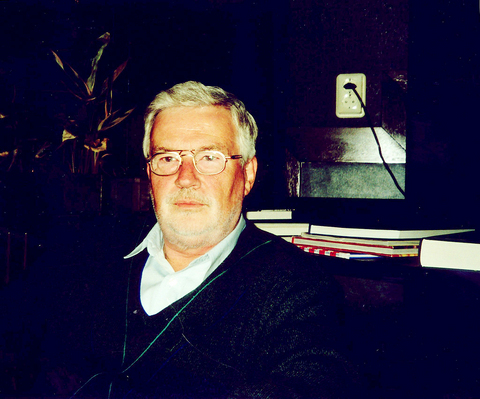In the first trial involving the mass killing of Iraqi Kurds with chemical weapons, a Dutch court on Friday sentenced a supplier of the weapon ingredients to 15 years in jail.
The judges convicted Frans van Anraat, 63, a Dutch businessman, of complicity in war crimes because they said he had known that the materials he sold to Iraq during the rule of former president Saddam Hussein could be used to make lethal poison gas.
The court acquitted him of complicity in genocide, because it said it could not be proved that he knew that the chemicals would be used for genocide. The raw materials were sent to Iraq before they were used in the mass attack against Kurdish villagers, the court said.

PHOTO: EPA
Van Anraat received the maximum sentence for complicity in war crimes. But the judges' decision said that "the crimes are of such a grave nature that even the maximum sentence cannot do them justice."
A group of Kurds, some of whom had joined the lawsuit as relatives of victims, applauded in court when the sentence was handed down, and several dozen others played music and danced outside the courthouse in The Hague afterward, witnesses said.
Lawyers involved in the monthlong trial said it was the first time a court had ruled that the attack by Saddam's troops on the town of Halabja in 1988 was genocide. The attack, which was part of a broader campaign against Iraqi Kurds, killed more than 5,000 people in a single day, while blinding and maiming many others.
The massacre also forms part of the charges brought against Saddam, who is now on trial in Baghdad in connection with a different large-scale killing.
Van Anraat's case is also the first in which a supplier of potentially harmful ingredients had been charged with genocide and convicted in connection with war crimes under a new mix of national and international law. In the past, the delivery of goods like the chemicals that van Anraat sold to Iraq despite export bans would probably have been dealt with as an economic crime, said Heikelina Verrijn-Stuart, a Dutch specialist in international law.
"This sends an important signal to suppliers and traders," she said.
"It says that they, too, can be prosecuted and held accountable for war crimes," she added.
The indictment of van Anraat said he had used a Panamanian company based in Switzerland to try to cover up his dealings with Iraq.
The indictment said the chemicals could be used as ingredients in mustard and nerve gases, which eventually were used against the Kurdish population in Iraq and during Iraq's war against Iran in the 1980s.
Prosecutors said van Anraat, acting as a middleman, had used schemes to ship the chemicals from Japanese producers via countries including Italy, Luxembourg, Switzerland and Singapore. He sent them under labels like "flame retardants."
During the trial, he admitted to selling the goods, but maintained that he thought they would be used in the textile industry. Several witnesses, including a Japanese business associate of van Anraat, testified that he knew of the materials' potentially lethal use.

Tens of thousands of Filipino Catholics yesterday twirled white cloths and chanted “Viva, viva,” as a centuries-old statue of Jesus Christ was paraded through the streets of Manila in the nation’s biggest annual religious event. The day-long procession began before dawn, with barefoot volunteers pulling the heavy carriage through narrow streets where the devout waited in hopes of touching the icon, believed to hold miraculous powers. Thousands of police were deployed to manage crowds that officials believe could number in the millions by the time the statue reaches its home in central Manila’s Quiapo church around midnight. More than 800 people had sought

DENIAL: Pyongyang said a South Korean drone filmed unspecified areas in a North Korean border town, but Seoul said it did not operate drones on the dates it cited North Korea’s military accused South Korea of flying drones across the border between the nations this week, yesterday warning that the South would face consequences for its “unpardonable hysteria.” Seoul quickly denied the accusation, but the development is likely to further dim prospects for its efforts to restore ties with Pyongyang. North Korean forces used special electronic warfare assets on Sunday to bring down a South Korean drone flying over North Korea’s border town. The drone was equipped with two cameras that filmed unspecified areas, the General Staff of the North Korean People’s Army said in a statement. South Korea infiltrated another drone

COMMUNIST ALIGNMENT: To Lam wants to combine party chief and state presidency roles, with the decision resting on the election of 200 new party delegates next week Communist Party of Vietnam General Secretary To Lam is seeking to combine his party role with the state presidency, officials said, in a move that would align Vietnam’s political structure more closely to China’s, where President Xi Jinping (習近平) heads the party and state. Next week about 1,600 delegates are to gather in Hanoi to commence a week-long communist party congress, held every five years to select new leaders and set policy goals for the single-party state. Lam, 68, bade for both top positions at a party meeting last month, seeking initial party approval ahead of the congress, three people briefed by

Cambodia’s government on Wednesday said that it had arrested and extradited to China a tycoon who has been accused of running a huge online scam operation. The Cambodian Ministry of the Interior said that Prince Holding Group chairman Chen Zhi (陳志) and two other Chinese citizens were arrested and extradited on Tuesday at the request of Chinese authorities. Chen formerly had dual nationality, but his Cambodian citizenship was revoked last month, the ministry said. US prosecutors in October last year brought conspiracy charges against Chen, alleging that he had been the mastermind behind a multinational cyberfraud network, used his other businesses to launder